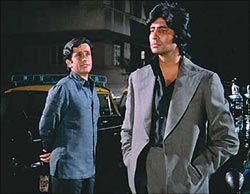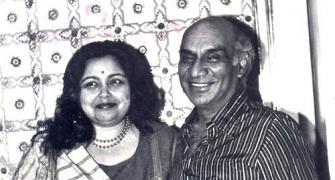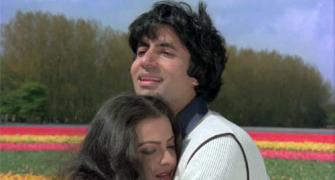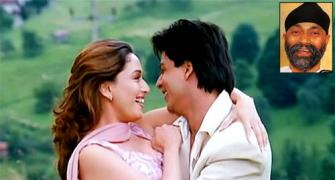 Dinesh Raheja salutes a man who lived his life like his last movie, Jab Tak Hai Jaan.
Dinesh Raheja salutes a man who lived his life like his last movie, Jab Tak Hai Jaan.At the chautha (condolence ceremony) for actor Rajesh Khanna, held at a Mumbai five-star hotel's banquet room, much to my embarrassment, I was stopped by the security, who blandly demanded some identification. Fortunately for me, Yash Chopra was ambling in, just behind me; he instantly came to my rescue and waved the security away.
The affable, ever-smiling Chopra was so ubiquitous a presence in filmdom that, after his demise, it will feel unreal not to spot him at the next event.
I may have done only one interview with the doyen (during Chandni in 1989) besides a couple of career graph articles but he has always invited me to the premieres of his films. And umpteen other filmi events he always greeted me with his special warmth.
By a strange coincidence, I bumped into him with remarkable frequency over the last year: at a play at the Prithvi theatre, north Mumbai, at a couple of condolence meets, at the premiere of English Vinglish, when I went to say hello to Madhuri Dixit and found Pam and him seated next to her, and, finally, at Amitabh's grand 70th birthday bash, just a few days ago. He looked as fit as a fiddle then; I find it difficult to believe that Chopra is no more, within a fortnight of that occasion.
Dengue and death claimed him too soon. But right to the end Yashji had a full life, marked with public recognition all the way through. Chopra is that rare Hindi film director who has delivered at least one successful film in each of the last six decades -- from Dhool Ka Phool (1959) to Waqt (1965) to Deewar (1975) to Chandni (1989) to Darr (1993) to Veer-Zaara (2004). He would have entered the seventh decade with the forthcoming Jab Tak Hai Jaan (2012) but fate willed otherwise.
Mortified that I might be stopped by the security guards at Yash Raj Films, I didn't muster up the courage to pay my last respects to the director. I would rather pay him a tribute in print.
Besides, I never got acquainted with Pam Chopra, the wife who was always by Yash's side; Uday Chopra I have never seen, forget met, and while I have met Aditya Chopra on the sets of Dilwale Dulhaniya Le Jaayenge and had a long conversation with him at Shah Rukh's residence, I respect his decision to keep the press at arm's length.
Since I don't know the family, I condoled with Sadhana, the heroine of his 1965 blockbuster Waqt. She texted back, "It is really sad. He was not only a great filmmaker but I have lost a very dear friend."
I also sent a condolence message to Anupam Kher, who was shooting abroad and was unable to come down for the last rites. A cup of morning tea with Yash Chopra was part of Anupam's routine.
People were charmed by Yash Chopra's films, and those who met him were charmed by his modest demeanor, which belied his achievements. A true people's person, Chopra put huge value into his relationships with friends and associates.
I remember attending a party to celebrate 20 years of Yash Raj Films, in which Yash honoured all his leading ladies: Waheeda Rehman, Mala Sinha, Sadhana walked onto the stage. Chopra may have become famous for his penchant for shooting in glossy Swiss locales, yet his films were about life, not lifestyle.
What attracts me to Chopra's cinema is his intermittent willingness to explore unconventional relationships and themes in his films like Daag (the leading lady finds her husband has married again), Kabhi Kabhie (an illegitimate girl tries to inveigle a place for herself in her mother's new family), Lamhe (a girl falls for a man who was in love with her mother), Kaala Patthar (a Conradian tale about redemption for a captain who abandons his drowning ship) and Silsila and Darr (the protagonist is obsessed with another man's wife).
Despite having successful filmmaker B R Chopra as his elder brother, Chopra started his career as an assistant director to I S Johar. Soon he was assisting elder brother B R Chopra too and directing films for the BR banner. Yash was 27 when his first film Dhool Ka Phool was released December 11, 1959. This black-and-white film, starring Rajendra Kumar, Mala Sinha and Nanda, who were all on the threshold of success, focused on plight of illegitimate children.
Though he began his career with a Dhool Ka Phool, Chopra truly made his first mark with colour extravaganza, Waqt (1965), a huge blockbuster in its day. The film had the key elements that producer B R Chopra held dear -- a unique theme, dulcet Ravi-composed numbers, a courtroom climax and pithy dialogue. But Yash Chopra also limned each frame with the colour of money. He dazzled viewers by presenting dashingly-attired heroes racing sports cars, and heroines clad in pastels listening to records in their wall-to-wall carpeted lake-view bungalows, swimming in five-star hotels, or enjoying a game of badminton on their neatly manicured lawns. Waqt established Yash Chopra's visual signature.
Fortunately, Chopra had the creative ability in him to marry style with substance. The experimental Ittefaq -- songless in the song-saturated sixties -- had sweet-faced Nanda effectively pull off playing a murderess, who launches a subtle seduction game (wearing a blue figure-hugging chiffon sari) with a runaway prisoner (Rajesh Khanna). The film was the director's litmus test. Chopra distinguished himself.
In the 1970s, Yash branched out from the B R Chopra banner to form his own production house, Yash Raj Films, but continued his association with Khanna in Daag, a bold exploration of the ménage a trois.
With the benchmark-setting Deewar (1975), Chopra moved on to a long, productive collaboration with Amitabh Bachchan. A lot of ink has been exhausted over Amitabh's memorable oratory in the film.
The Mere paas maa hai dialogue has provided fodder for scores of stand-up comedians. But I would like to highlight Deewar for the way Yash Chopra handled Parveen Babi's cameo. It defied Hindi cinema's norms depicting a heroine who not only flaunted her drink openly, but also indulged in premarital sex with her lover, Amitabh.
The poignancy that reverberated when her dream of wearing sindoor ended in a blood-soaked wedding sari, made her death one of cinema's most memorable scenes.
Chopra's later sugary films paid overt obeisance to traditional values, but way back in 1976, he struck a finer balance -- he created a one-of-a-kind Hindi film hero in Vijay (played by Shashi Kapoor) in Kabhi Kabhie. Contrasting Amitabh's granite-faced toeing of the conservative line in the film, Vijay was refreshingly avant garde, a large-hearted man amongst narrow-minded boys.
 When Vijay figures out that his wife (Raakhee) had once loved Amitabh, he lets off steam at first, only to realise that he is behaving boorishly and is contrite. Here is that rare screen hero, human enough to experience jealousy but also able to temper it with reason.
When Vijay figures out that his wife (Raakhee) had once loved Amitabh, he lets off steam at first, only to realise that he is behaving boorishly and is contrite. Here is that rare screen hero, human enough to experience jealousy but also able to temper it with reason.
Amitabh-Shashi Kapoor-Yash Chopra did five films in a row -- Deewar, Kabhi Kabhie, Trishul, Kaala Patthar and Silsila.
Though Chopra's work was greeted less enthusiastically in the 1980s, he refused to allow commercial considerations to atrophy his creative instincts. Tackling a bold subject like extramarital affairs in Silsila might have not worked too well for him; but after Chandni (1989) brought him back into the reckoning, he had the nerve to venture outside the incestuous circle of pre-tested success to give us a cross-generational love affair in Lamhe and a sympathetic look at an evil protagonist in Darr.
In his 70s, Chopra refused to be consigned to history like his peers. Yes, Yash did slow down and passed on the baton to son Aditya. Over the last decade-and-a-half, he directed only two placid romances -- Dil To Pagal Hai and Veer Zaara (both starring Shah Rukh Khan). But whenever I met him, he was always more interested in talking about the film on hand rather than his past laurels.
I am not surprised that his last film (to be released posthumously) is called Jab Tak Hai Jaan.
I miss seeing Yash Chopra at the ongoing 14th Mumbai Academy of the Moving Image film festival in Mumbai. I remember him at previous festivals, entering cinema halls with the enthusiasm of a movie aficionado, who had just graduated from film school.
Dinesh Raheja, author of The Hundred Luminaries of Hindi Cinema, The Bollywood Saga, was the editor of Movie magazine in 1990 and is now the editor of Bollywood News Service.
Yash Chopra's photograph: Pradeep Bandekar









